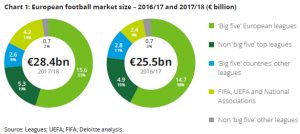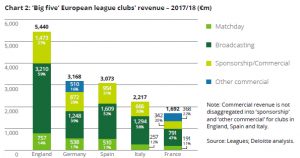This 28th edition charts the latest movements on the ever fluid football finance landscape. Whilst the Premier League retains its leadership in financial terms, the Premier League clubs face challenges to continue to deliver revenue growth and profitability. Meanwhile, Championship clubs are increasingly gambling to reach the top, and strenuous and creative efforts are being made by other European football leagues to enhance their own global appeal and close the gap to the Premier League.


You’ve got to hold and give
In a Premier League season which saw Manchester City achieve the widest winning points margin in history between first and second place, Premier League clubs were unable to extend their own significant revenue lead in global football, as the German Bundesliga narrowed the revenue gap slightly. Nonetheless, the Premier League comfortably managed to hold its position as the largest revenue generating league in the world.
The Bundesliga benefited from the commencement of a new broadcasting deal, which saw a step-change in the league’s broadcast revenue. Whilst the Premier League’s closest rivals are seeking to play catch up with recent growth in their respective broadcast deals, the 2019/20-2021/22 Premier League broadcast rights cycle has seen more marginal net increases as international growth compensated for a domestic reduction. For context, it should be remembered that this follows two previous cycles of substantial broadcast revenue growth.
Therefore, it is imperative for Premier League clubs to remain dynamic in the creation of their own revenue, with a focus on matchday and commercial revenues, in order to maintain its substantial revenue advantage.
Tottenham Hotspur’s new stadium, which opened its doors in April 2019, is the highest profile example of such dynamism. The stadium has been designed and built with a view to operating not just as a football stadium for 90 minutes, but rather an entertainment destination, including a ‘Sky Walk’ and its own microbrewery, as well as a ten-year partnership with the NFL to be the dedicated home of the NFL in the UK.
With regards to commercial revenue, many Premier League and European clubs are looking to continue to utilise and grow their global footprint and popularity created in part through broadcast exposure in order to drive interest, and more importantly value, from their commercial partners. The key to success is connecting with and delivering value to their worldwide fanbase. Four Premier League teams are competing in the Premier League Asian Trophy in Shanghai in July 2019, and pre-season friendlies announced to date cover eight different countries, with China and USA being the most popular destinations, owing to the perceived commercial growth potential in relatively underdeveloped football markets in the world’s two largest economies.
A record five teams competing in the UEFA Champions League helped drive the Premier League clubs’ record revenue in 2017/18 . The lucrative value of this competition to the ‘big six’, as well as the intensely competitive nature of the division itself, has resulted in clubs spending more of their revenue on wages to obtain and retain the best playing talent. This was clearly evident with two record transfer windows in the 2017/18 season, as well as an increase in the wages to revenue ratio in the Premier League.
Given the onus is now on clubs to generate revenue growth from sources other than broadcast revenue, coupled with the higher levels of wage spend, it may put downward pressure on pre-tax profits from the record breaking levels of recent years.
Commendably, in addition to parachute payments to relegated clubs, each season the Premier League provides contributions to support the wider football pyramid and various charitable causes. This was about £200m in 2017/18, equivalent to almost 7% of the League’s total central revenues for the year. Meanwhile, £211m exited the game in payments by Premier League clubs to agents.
As the Premier League and its clubs have enjoyed record revenues, profitability and investment in recent years, there is increased opportunity and pressure to further boost the future level of support to the wider football pyramid, charitable donations and good causes. Additional investment in a range of initiatives could undoubtedly benefit communities and enhance football’s role and position in society. For example, more investment to provide pitches and facilities for grassroots football, to help develop the women’s game; to promote anti-discrimination activities; to promote mental health and lifestyle issues; and to support the education and betterment of the next generation.
Dan Jones, Partner
www.deloitte.co.uk/sportsbusinessgroup
More: Annual Review of Football Finance 2019
